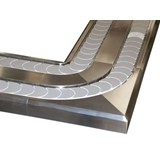Yet, as the demand from customers for access to weekend dining steadily increases, it seems odd that more and more cafes and restaurants are closed on Sundays. Why is that?
The simple truth is that small business owners of cafes and restaurants are being hammered by an out-of-date workplace relations system that penalises them with huge employment costs for just trying to open during these peak demand periods.
The term "penalty rates" is appropriate given that they penalise everyone involved – the business owner can't afford to open, the customer goes without service, the staff are not hired for the shift and the government is denied taxes from the extra day of trading – it is a lose/lose/lose/lose scenario.
The idea of penalty rates stems from a time in the past when weekends were considered sacrosanct, where most businesses were closed and where the main streets of suburbs and towns were empty and quiet as a result.
Community expectations have long since changed, and our suburban and regional shopping strips are now alive on weekends, but the employment laws have barely left the 19th century, and are driving us back to the olden days of closed weekends.
The Federal Government started the process of 'modernising' Australia's industrial awards system back in 2009.
Awards are the rules that govern how workplaces operate in hundreds of industries across the country, and particularly how much an employee gets paid on which days and during which times.
There used to be thousands of such awards, but the government decided to cut them down to just a few hundred.
Sounds like a good idea. But the process of rationalising the number of awards has resulted in a 'highest common denominator' approach where the most generous award provisions have been adopted and then applied to all industries regardless of the vastly differing needs of those sectors.
And it's these new higher penalty rates that are killing Sunday trade. Just another example of how good ideas deliver unintended consequences when they are poorly executed.
Did you know that in January, a major cruise liner came into Sydney Harbour, unloaded its passengers to enjoy breakfast in the city, but within half an hour most had returned to the ship because there were such limited options for dining in Sydney on a Sunday morning?
Currently, a cafe or restaurant which opens on a Saturday has to pay 25 per cent more in wages, and a shocking 50 per cent more on a Sunday, regardless of whether the staff would actually prefer to work on weekends due to weekday commitments like university.
The owner is being slugged for providing the service that their customers demand. The current award system is simply unfair. It's unfair for the business owner who has to close or operate at a loss for trying to meet their customers' expectations, and it's unfair on the staff that want to work but are being denied shifts due to exorbitant penalty rates.
That's why the NSW Business Chamber, in partnership with Restaurant & Catering Australia, is asking Fair Work Australia for a new way of paying penalty rates.
Penalty rates are appropriate in certain circumstances, but we need a fairer approach to how they are applied. We are simply seeking to remove the penalty that is attached to trading on particular days of the week.
Under the proposal, employees will be paid penalty rates if they work more than five consecutive shifts.
Basically, the sixth time someone gets out of bed and heads to work, they will be paid a 25 per cent bonus, and then a 50 per cent bonus for the seventh or more time that they work in any week. This is a common sense approach that will remove the financial burden that is preventing small businesses from opening on weekends and reward the loyal staff that work extra shifts to support their employer's business.
If a business is closed, it doesn't matter what the penalty rate is, no employee will be receiving it. It's in everyone's interest for a business to be open, providing services to its customers, creating jobs and contributing much needed tax dollars to the government's coffers. But we need a new 'modern' approach to penalty rates if this is the outcome that we want to achieve.
The so called 'modern' award system is broken, and the time has well and truly come to fix it.
- Suppliers
- New to HospitalityHub? Book a Demo
- Advertise with us
- Login
- Email Marketing
- Buyers
- Get Quotes
- Articles & Ideas
- Login
- Subscribe to newsletter
- My Details
- Get Quotes
- Bakery & Dough Processing Equipment
- Bar Equipment & Barware
- Bathroom Fixtures & Accessories
- Chocolate Making Machinery
- Cleaning & Housekeeping
- Commercial Coffee Equipment
- Commercial Cooktops
- Commercial Fridges & Freezers
- Commercial Kitchen Equipment
- Commercial Ovens
- Dish, Utensil & Glass Washing
- Entertainment & Outdoor
- Food Packaging & Ingredients
- Food Preparation Equipment
- Furniture & Fixtures
- Pizza & Pasta Making Equipment
- Point of Sale, AV & Technology
- Get Quotes
- Bakery & Dough Processing Equipment
- Bar Equipment & Barware
- Bathroom Fixtures & Accessories
- Chocolate Making Machinery
- Cleaning & Housekeeping
- Commercial Coffee Equipment
- Commercial Cooktops
- Commercial Fridges & Freezers
- Commercial Kitchen Equipment
- Commercial Ovens
- Dish, Utensil & Glass Washing
- Entertainment & Outdoor
- Food Packaging & Ingredients
- Food Preparation Equipment
- Furniture & Fixtures
- Pizza & Pasta Making Equipment
- Point of Sale, AV & Technology
Trusted by 200,000+ Australian hospitality buyers
Buyers
- Discover products & solutions
- Login
- Subscribe To Newsletter
- Browse All Products
- Read Articles
Suppliers
Advertise
- Promote your products & solutions
- New to HospitalityHub? Book a Demo
- Login / Forgot Password
- Advertise Your Products
- Success Stories
- Email Marketing
Trusted by 200,000+ Australian hospitality buyers






